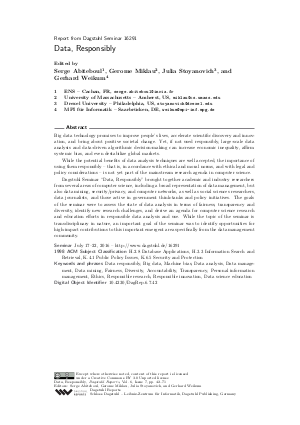Data, Responsibly (Dagstuhl Seminar 16291)
Authors Serge Abiteboul, Gerome Miklau, Julia Stoyanovich, Gerhard Weikum and all authors of the abstracts in this report
-
Part of:
Issue:
Dagstuhl Reports, Volume 6, Issue 7
Part of: Volume: Dagstuhl Reports, Volume 6
Part of: Journal: Dagstuhl Reports (DagRep) - License:
 Creative Commons Attribution 3.0 Unported license
Creative Commons Attribution 3.0 Unported license
- Publication Date: 2016-11-28
File

PDF
DagRep.6.7.42.pdf
- Filesize: 0.87 MB
- 30 pages
Document Identifiers
Subject Classification
Keywords
- Data responsibly
- Big data
- Machine bias
- Data analysis
- Data management
- Data mining
- Fairness
- Diversity
- Accountability
- Transparency
- Personal information management
- Ethics
- Responsible research
- Responsible innovation
- Data science education
Metrics
- Access Statistics
-
Total Accesses (updated on a weekly basis)
0Document
0Metadata
Abstract
Big data technology promises to improve people's lives, accelerate scientific discovery and innovation, and bring about positive societal change. Yet, if not used responsibly, large-scale data analysis and data-driven algorithmic decision-making can increase economic inequality, affirm systemic bias, and even destabilize global markets. While the potential benefits of data analysis techniques are well accepted, the importance of using them responsibly - that is, in accordance with ethical and moral norms, and with legal and policy considerations - is not yet part of the mainstream research agenda in computer science. Dagstuhl Seminar "Data, Responsibly" brought together academic and industry researchers from several areas of computer science, including a broad representation of data management, but also data mining, security/privacy, and computer networks, as well as social sciences researchers, data journalists, and those active in government think-tanks and policy initiatives. The goals of the seminar were to assess the state of data analysis in terms of fairness, transparency and diversity, identify new research challenges, and derive an agenda for computer science research and education efforts in responsible data analysis and use. While the topic of the seminar is transdisciplinary in nature, an important goal of the seminar was to identify opportunities for high-impact contributions to this important emergent area specifically from the data management community.
Cite As Get BibTex
Serge Abiteboul, Gerome Miklau, Julia Stoyanovich, and Gerhard Weikum. Data, Responsibly (Dagstuhl Seminar 16291). In Dagstuhl Reports, Volume 6, Issue 7, pp. 42-71, Schloss Dagstuhl – Leibniz-Zentrum für Informatik (2016)
https://doi.org/10.4230/DagRep.6.7.42
BibTex
@Article{abiteboul_et_al:DagRep.6.7.42,
author = {Abiteboul, Serge and Miklau, Gerome and Stoyanovich, Julia and Weikum, Gerhard},
title = {{Data, Responsibly (Dagstuhl Seminar 16291)}},
pages = {42--71},
journal = {Dagstuhl Reports},
ISSN = {2192-5283},
year = {2016},
volume = {6},
number = {7},
editor = {Abiteboul, Serge and Miklau, Gerome and Stoyanovich, Julia and Weikum, Gerhard},
publisher = {Schloss Dagstuhl -- Leibniz-Zentrum f{\"u}r Informatik},
address = {Dagstuhl, Germany},
URL = {https://drops.dagstuhl.de/entities/document/10.4230/DagRep.6.7.42},
URN = {urn:nbn:de:0030-drops-67644},
doi = {10.4230/DagRep.6.7.42},
annote = {Keywords: Data responsibly, Big data, Machine bias, Data analysis, Data management, Data mining, Fairness, Diversity, Accountability, Transparency, Personal information management, Ethics, Responsible research, Responsible innovation, Data science education}
}
